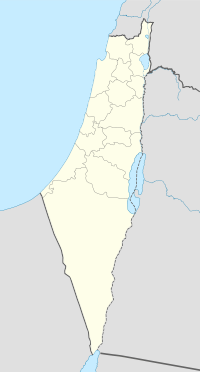Al-Na'ima (Arabic: الناعمة) was a Palestinian Arab village in the Safad Subdistrict of Mandatory Palestine located 26 kilometres (16 mi) northeast of Safad, near the al-Hula Plain. The settlement was depopulated during the 1947-1948 civil war on May 14, 1948 by the Israeli Palmach's First Battalion as part of Operation Yiftach.
Al-Na'ima
الناعمة | |
|---|---|
| Etymology: The soft soil[1] | |
A series of historical maps of the area around Al-Na'ima (click the buttons) | |
Location within Mandatory Palestine | |
| Coordinates: 33°11′17″N 35°35′42″E / 33.18806°N 35.59500°E | |
| Palestine grid | 206/288 |
| Geopolitical entity | Mandatory Palestine |
| Subdistrict | Safad |
| Date of depopulation | May 14, 1948[4] |
| Area | |
| • Total | 7,155 dunams (7.155 km2 or 2.763 sq mi) |
| Population (1945) | |
| • Total | 1,240 (1,340 Arabs and 210 Jews)[2][3] |
| Cause(s) of depopulation | Influence of nearby town's fall |
| Current Localities | Neot Mordechai,[5] Kefar Blum,[5] and Beyt Hillel[5] |
In the 1945 statistics it had a population of 1,240 of whom 210 were Jews.[2]
History
editIn 1881, during the late Ottoman period, the PEF's Survey of Western Palestine described the village as a "Stone and mud village, on the Huleh Plain, containing about 100 Moslems".[6]
British Mandate era
editThe village had a boys' elementary school.[5] A shrine dedicated to local sage al-Shaykh al-Wayzi lay about 0.5 kilometres (0.31 mi) from the site as did a stone quarry.
In the 1931 census of Palestine, conducted by the British Mandate authorities, En Na'ima had a population of 858, all Muslims, in a total of 174 houses.[7]
Types of land use in dunams in the village in the 1945 statistics:[8][9]
| Land Usage | Arab | Jewish |
|---|---|---|
| Irrigated and plantation | 4,122 | 2,197 |
| Cereal | 156 | 217 |
| Cultivable | 4,278 | 2,414 |
| Urban | 112 | 0 |
| Non-cultivable | 60 | 0 |
The land ownership of the village before occupation in dunams:[3]
| Owner | Dunams |
|---|---|
| Arab | 4,450 |
| Jewish | 2,414 |
| Public | 291 |
| Total | 7,155 |
1948, and aftermath
editDuring the 1948 war, Al-Na'ima was depopulated during Operation Yiftach which targeted Safad and the surrounding district. When the city of Safad was finally attacked between the 10 and 11 May 1948, morale in the village was low; according to an Israeli intelligence report, many residents fled on 14 May shortly before advancing Israeli troops entered.[5]
The settlement of Neot Mordechai was built in 1946 to the south of the village while to the north is the settlement of Beyt Hillel, built in 1940. Kefar Blum, built in 1943 lies 2 kilometres (1.2 mi) to the southeast.[5]
References
edit- ^ Palmer, 1881, p. 31
- ^ a b Department of Statistics, 1945, p. 10
- ^ a b c Government of Palestine, Department of Statistics. Village Statistics, April, 1945. Quoted in Hadawi, 1970, p. 70 Archived 2015-09-24 at the Wayback Machine
- ^ Morris, 2004, p. xvi, village #19. Also gives cause of depopulation.
- ^ a b c d e f Khalidi, 1992, p. 482
- ^ Conder and Kitchener, 1881, p. 89
- ^ Mills, 1932, p. 109
- ^ Government of Palestine, Department of Statistics. Village Statistics, April, 1945. Quoted in Hadawi, 1970, p. 120
- ^ Government of Palestine, Department of Statistics. Village Statistics, April, 1945. Quoted in Hadawi, 1970, p. 170
Bibliography
edit- Conder, C.R.; Kitchener, H.H. (1881). The Survey of Western Palestine: Memoirs of the Topography, Orography, Hydrography, and Archaeology. Vol. 1. London: Committee of the Palestine Exploration Fund.
- Department of Statistics (1945). Village Statistics, April, 1945. Government of Palestine.
- Esber, R.M. (2008). Under the Cover of War, The Zionist Expulsions of the Palestinians. Arabicus Books & Media. ISBN 978-0981513171.
- Hadawi, S. (1970). Village Statistics of 1945: A Classification of Land and Area ownership in Palestine. Palestine Liberation Organization Research Center. Archived from the original on 2018-12-08. Retrieved 2009-08-18.
- Khalidi, W. (1992). All That Remains: The Palestinian Villages Occupied and Depopulated by Israel in 1948. Washington D.C.: Institute for Palestine Studies. ISBN 0-88728-224-5.
- Mills, E., ed. (1932). Census of Palestine 1931. Population of Villages, Towns and Administrative Areas. Jerusalem: Government of Palestine.
- Morris, B. (2004). The Birth of the Palestinian Refugee Problem Revisited. Cambridge University Press. ISBN 978-0-521-00967-6.
- Palmer, E.H. (1881). The Survey of Western Palestine: Arabic and English Name Lists Collected During the Survey by Lieutenants Conder and Kitchener, R. E. Transliterated and Explained by E.H. Palmer. Committee of the Palestine Exploration Fund.
External links
edit- Welcome To al-Na'ima
- al-Na'ima, Zochrot
- al-Na'ima at Khalil Sakakini Cultural Center
- Al-Na'ima Dr. Khalil Rizk.
- Survey of Western Palestine, Map 2: IAA, Wikimedia commons




